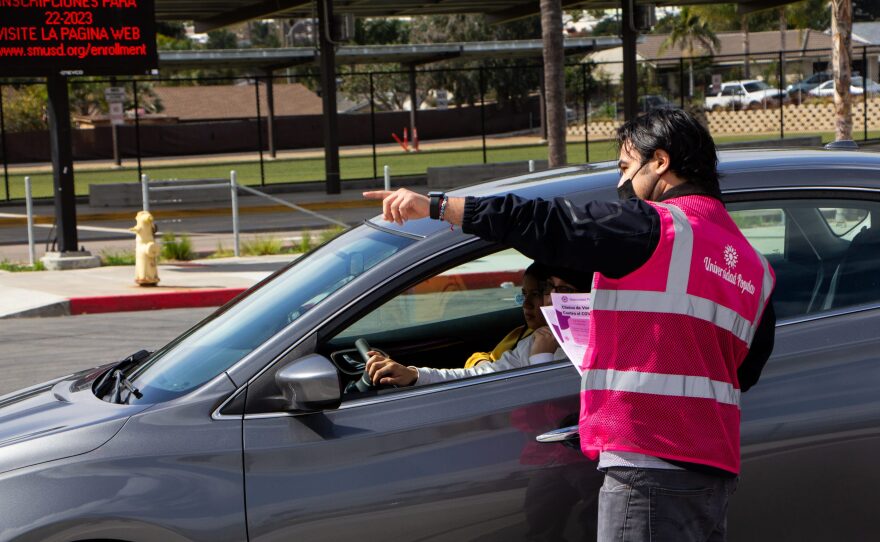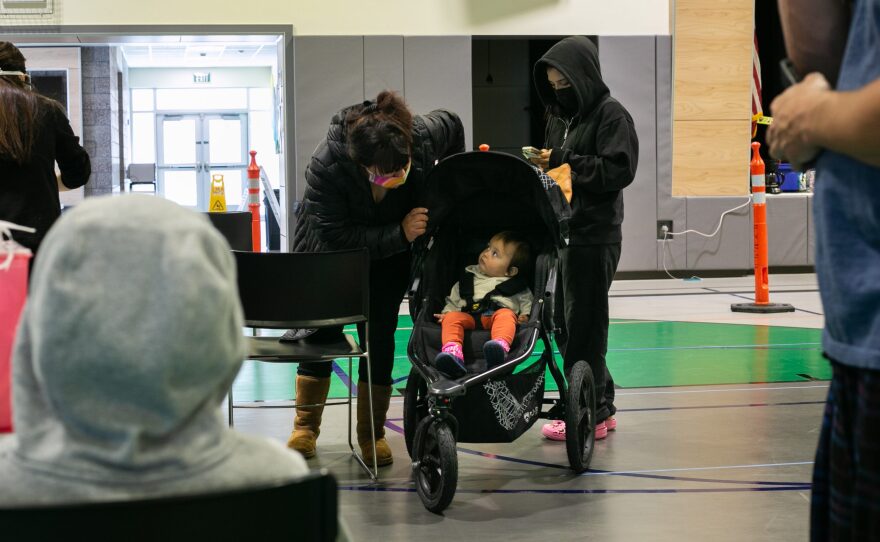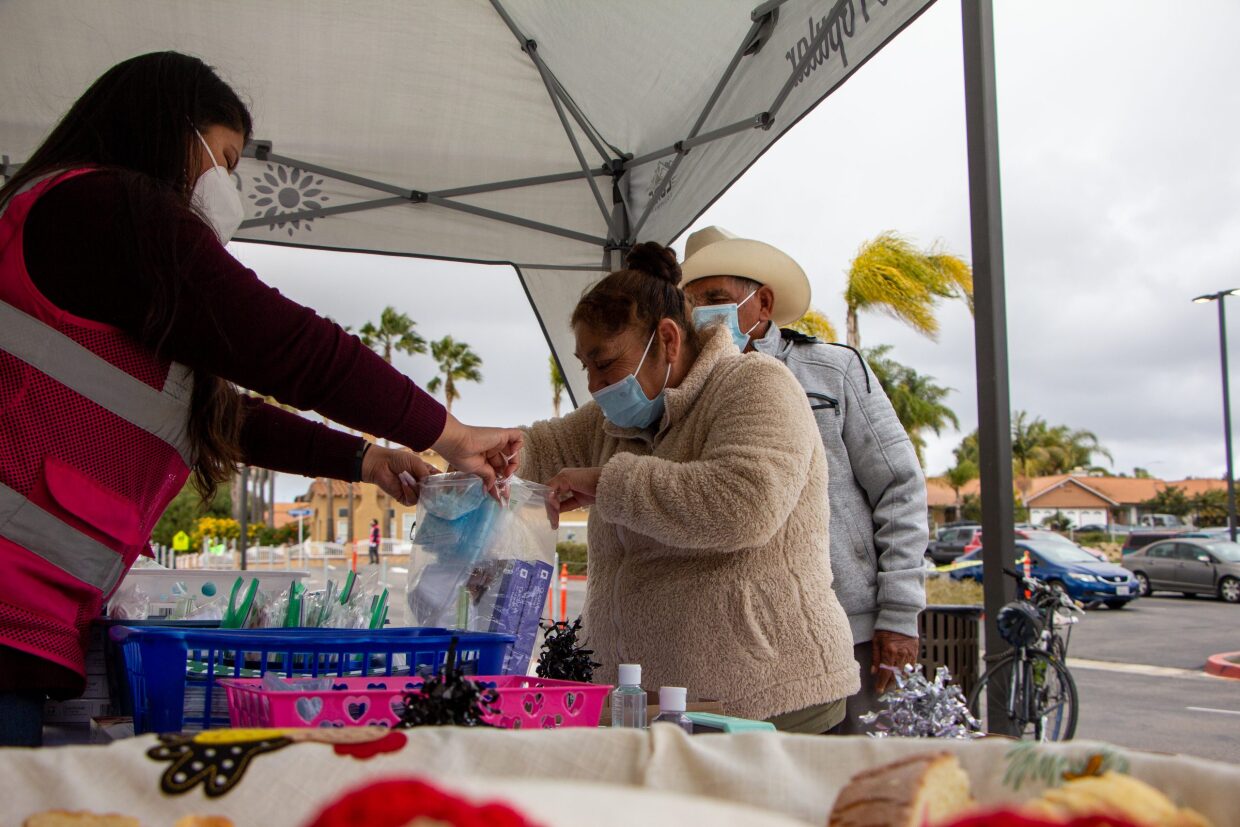On a rainy Saturday morning in March, volunteers with Universidad Popular huddle under a tent outside a vaccine clinic in San Marcos serving cafe de olla and handing out masks and COVID-19 test kits.
They’re part of a network of community groups partnering with the state health department to vaccinate hard-to-reach populations. Trusted community groups like Universidad Popular bring the people, and the county supplies the vaccines and medical staff.
But at vaccine clinics in San Marcos and Escondido, advocates with Universidad Popular said San Diego County has made that goal more difficult –– by requiring a photo ID to receive a COVID-19 vaccine.
Despite state policy that says immigration status does not affect vaccine eligibility, the county requires a photo ID and proof of age to receive a vaccine at its clinics, according to its policies published on the county’s website. That documentation can be harder for those without legal status in the U.S. to provide.
County officials have said that their policy is to work with individuals who cannot provide a photo ID to find other options for verifying their identity. However, that policy isn’t posted online in the county’s vaccine information website.
And advocates with Universidad Popular said that policy doesn’t always play out on the ground.
Asked by inewsource for data on how many people have been turned away for not providing an ID or assisted by county staff in finding appropriate identification, a county spokesperson said the county does not track those instances.
Workers at the county's vaccine clinics have expressed confusion over the county's ID policy in emails to their supervisors asking for guidance on what to do when someone shows up without a photo ID. In those emails, clinic staffers indicated that some people were getting turned away from the county's clinics for lack of ID.
The ID policy has led some people to avoid seeking vaccines altogether, advocates say.
“We've met families that do tell us they've stayed away from seeking vaccines because they don't have an ID,” Arcela Nuñez-Alvarez, co-director and co-founder for Universidad said.
“They don't want to show up and be asked to present it and then be in a situation where they’re just afraid that information might be shared with immigration or other officials.”
Universidad Popular is focusing vaccination efforts in a handful of census tracts where residents are among the least vaccinated in the county. Those tracts lie in largely Latino neighborhoods in northern San Diego County.
Ninez Ponce, a professor at UCLA’s Fielding School of Public Health, said the county’s photo ID policy, and the chilling effect it could have on vaccination rates among undocumented people, should be concerning for everyone in the community.
“Denying a segment of our population access to vaccines because of paperwork” won’t end the pandemic any sooner, Ponce said.
La Mirada Academy, one of two sites where Universidad Popular hosts vaccine clinics with the county, borders a census tract with one of the lowest vaccination rates in San Diego County.
That particular census tract falls in the third percentile of vaccination rates in the county as of late March, meaning 97% of census tracts in the county have higher vaccination rates.
About 60% of the people over the age of 5 in that tract are fully vaccinated as of mid-April. In another neighboring tract, the vaccination rate is 52%.
Although the county provides only about 10% of the total vaccines administered across the county –– most other vaccines are now administered through local health clinics or private care physicians –– Nuñez-Alvarez said there’s usually at least one person at each Universidad Popular vaccine clinic who gets turned away by county staff for not being able to provide an ID.
“For a lot of these migrants, especially the men, coming to a vaccination event is the only and the first contact that they've had –– for many of them ever –– with a health care system,” Nuñez-Alvarez said. “They're coming from villages or countries where they never access these kinds of resources so even the questioning, it's quite intimidating for them.”
The interactions undocumented people have at vaccine clinics could be what encourages or discourages them from seeking public resources in the future, Nuñez-Alvarez said.
San Diego County’s vaccine guidelines online state a photo ID and proof of age are required to receive a vaccine. A flyer for vaccine information lists examples such as a birth certificate, driver’s permit or passport.
Michael Workman, spokesperson for San Diego County, said the policy is necessary to verify a person’s identity. But at least one other county in California, Los Angeles County, states online that no photo ID is required at its public health vaccine clinics.
When a person can’t provide those documents, San Diego County staff will work with a patient to verify their identity in order to receive a vaccine, according to Workman.
“If someone does not have ID, that person is elevated to a supervisor who will assist. A driver (license) from a foreign country, a boss, a paycheck, another member of the household, a consular card, a previous entry (into) the vaccine registry” are all acceptable forms of identification, Workman said in an email.
“Just about 7 million vaccine doses have been administered in the county thus far and very few instances or complaints,” Workman said in an email.
Emails obtained by inewsource as recent as February suggest the county’s ID policy has been confusing for vaccine clinic staff.
In January, a clinic staffer emailed county health officials saying, “we have had some people saying they are seeing ads that say they do not need to have identification for the covid vaccine and come with no identification.” A supervisor responded, confirming that the county’s policy is to “verify identity” and that “broad” forms of identification are acceptable.
In February, a nurse emailed a supervisor that a patient showed up to a site without a photo ID.
“[Staff] let her know she needed an ID and she became upset and asked to speak to someone else,” the nurse said. “I told that we want to work with her and if she has anything government issued, we can vaccinate her,” the nurse continued.
County officials also fielded a request to clarify the ID policy from a state public health official who said he’d heard some clinics were turning people away for a “lack of proper identification” and then later accepting them “with additional support confirming their form of identification is an accepted form to receive the vaccination.”
The official also asked for guidance on what assistance is available for people “who may experience this situation moving forward.”
inewsource visited several county-run vaccine clinics in March to ask about the photo ID policy. A supervisor at one county vaccine site said that if patients show up asking for a vaccine without a photo ID, the county cannot vaccinate them, but she said she hadn’t heard of anyone being turned away for that reason.
inewsource is not naming the supervisor because she said she was not authorized to speak to the media.
Two other clinics visited in March refused to answer questions from the inewsource reporter.

The Consulate General of Mexico in San Diego partnered with the county to hold vaccine clinics and testing sites several times a week earlier in the pandemic, resulting in 3,500 vaccines administered, said Consul General Carlos González Gutiérrez.
There were a few cases in which someone at the consulate vaccine clinic needed help obtaining an ID to receive the vaccine, but overall the ID requirement did not present a major obstacle, González Gutiérrez said.
“We encourage people to come forward, to get vaccinated, or to get tested with security, the full conviction that whatever we were to provide would not place them at risk with immigration threat.”
However, some Mexican communities in the county have been harder to reach than others, “particularly those who are farm workers, those who work in the fields,” he said.
Lilian Serrano, community educator and co-director at Universidad Popular, said at every vaccine clinic they’ve held with the county, her team has battled staff until they agree to loosen the ID requirement so that someone who showed up without a photo ID can receive the vaccine.
“When we have folks that don't have an ID, county staff always turns them away,” Serrano said. “It's almost like a dance that we do every clinic because then the person walks away. Then I go find out why they’re being turned away. It's because of the ID.”

Then Serrano said she finds the supervisor and explains that “we have a farm worker from Valley Center who made their way to Escondido, which is a 45 minute drive who has not received a single shot against COVID-19 who needs their vaccine and is right there and willing.”
Ponce, the UCLA research who specializes in immigrant and global health, said the undocumented community, many of whom were considered essential workers during the pandemic, faced high risk of contracting COVID-19 before vaccines were widely available.
Now, the photo ID policy could be creating a “chilling effect” on individuals without legal status who worry that getting a vaccine could jeopardize their presence in the U.S.
And that could mean undocumented folks are deciding between “vaccines, or I may get deported, vaccines, or I may lose my job, vaccines or getting food,” Ponce said. “You're giving these really just hard choices to people.”







